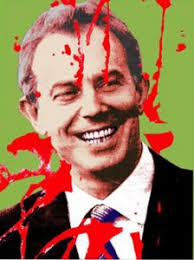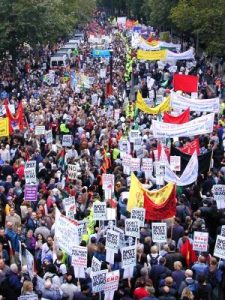
From leftfutures.org
One feature of growing older is that every new day seems to be an anniversary of some sort or other – an anniversary of something you did, or something you experienced, or something big or small that you witnessed happening in the world. For instance, just last Friday, March 17th – St Patrick’s Day 2023 – I realised it was 30 years exactly since some friends and I went to see the great Belfast punk band Stiff Little Fingers at Glasgow Barrowland. Both Stiff Little Fingers and the Barrowland, I’m pleased to report, are still on the go; and their histories have been happily entwined during the three decades since. As the latter’s Wikipedia entry reports: “Northern Irish punk band Stiff Little Fingers have played sold-out concerts at the venue every St Patrick’s Day since 1992, and recorded their Best Served Loud album there in 2016 to celebrate 25 years at Barrowland.”
Even if it reminds me of how ancient I am now, that’s at least an anniversary of something I remember fondly. However, there’s nothing fond I remember about the event that today, March 20th, is the anniversary of. It’s now been twenty years since Western military forces, mainly American and British ones directed by President George W. Bush and Prime Minister Tony Blair, blasted their way into Iraq.
The invasion was launched in order to depose Saddam Hussein who, it was claimed, possessed Weapons of Mass Destruction. It transpired, though, that these WMDs didn’t exist and it became obvious that Bush and Blair had spun a web of lies beforehand to make people believe that they did. In the two decades since the invasion, those WMDs haven’t been the only things to not exist. The Iraq Body Count Project has calculated that, up until 2019, between 183,535 and 206,107 Iraqi people have stopped existing too. Their deaths have been a result of Bush and Blair’s actions – of the invasion, the bungled Western occupation and its chaotic aftermath.
George Bush once donned a flak jacket, posed on the deck of an American aircraft-carrier and boasted that the ‘mission’ in Iraq was ‘accomplished’. That seems a very long time ago now. Mind you, through the dubious involvement in the supposed occupation and ‘reconstruction’ of Iraq by outfits such as Haliburton, the debacle succeeded in lining the likes of Dick Cheney’s pockets very nicely. I suppose that was the real point of it.
Of course, the Iraq War helped to put some coinage into Tony Blair’s pockets too. Thanks to his support for the second-most right-wing and incompetent president in American history, the former PM was for a long time revered in Republican sectors of the USA and he made more than a few bob on the public speaking circuit there. (He also profited from a dodgy job negotiating the movement of oil between Iraq and South Korea.) I suppose his popularity in America reduced his pain at being less admired in other parts of the world. For instance, I was working in India during the worst phase of the ‘official’ Iraq War – Abu Ghraib and all that – and whenever I read the Indian English-language newspapers, his name seldom appeared in a sentence without being accompanied by the words ‘poodle’ or ‘lapdog’.
I’d never trusted Blair. His big smile and ingratiating, want-to-be-your-pal manner struck me as phoney, especially compared to the plain-speaking, no-nonsense demeanour of his predecessor as Labour Party leader, John Smith, who died unexpectedly in 1994. However, up until 2003, and having recently endured 18 years of Conservative government, I’d consoled myself with the thought that “At least he isn’t as bad as that other lot.” He headed a political party that claimed to have some conscience, principles and scruples, the supposed antithesis of Maggie Thatcher and her cynical gang. But events in March 2003 changed my opinion.
To be fair, in Britain, it wasn’t just Blair who willed the invasion into happening. He had the support of many in his party, though with a few noble objectors like the late Robin Cook, and the Tories backed him to the hilt. In fact, among the Westminster-based parties, it was only Charles Kennedy’s Liberal Democrats who showed some spine and opposed the bloody thing. It goes without saying that the majority of Britain’s predominantly right-wing newspapers were cheerleaders for it too.

From wikipedia.org / © William M. Connelly
And, though people still talk about the anti-war protests on February 15th, 2003, which saw the biggest ever political demonstration in London’s history take to the capital’s streets (and was the subject of Ian McEwan’s rather annoying 2005 novel Saturday), I’m afraid to say it had the support of a good chunk of the British population as well. Before and during the initial invasion, I was living in Newcastle-upon-Tyne, but for personal reasons I also spent a lot of time down in East Anglia. Nearly everyone I know in Newcastle – Labour supporters to a man and woman – was horrified by what Blair was doing. But down south, it was a different story. I heard people saying it in pubs, and saw it on stickers in car windows. This war was right, Saddam Hussein was going to blow us up with his WMDs, we needed to hit him before he hit us, we had to support ‘our boys’, and if you were anti-war you were unpatriotic, a coward, a traitor. It was the mentality that, nearly 80 years earlier, had seen young men humiliated by getting white feathers if they didn’t sign up to fight amid the mud and bloodshed of the trenches.
Everything that happened in Iraq was a reprehensible failure – morally, politically, even in terms of making ground against Osamu Bin Laden in the supposed War on Terror. (It took a Navy SEALs raid in Pakistan during the Obama era to put an end to him.) In Britain, it loosened the Labour Party’s hold on power and paved the way for the David Cameron government and its disastrous austerity policies. It also shook the public’s faith in politicians and what they saw as ‘the establishment’ and, arguably, helped lead to the 2016 vote to leave the European Union, which was Britain’s other huge, idiotic mistake of the 21st century. But all this never dented Blair’s belief that invading Iraq with Bush was the correct thing to do. He was right and those millions of people who came onto the streets to protest against the invasion were wrong.
A lot of this, I suspect, was down to Blair being a devout Christian. Since God was on his side, he reasoned, his decision to back Bush must have divine sanction. Bush, of course, professed to being a Christian too, although I couldn’t imagine the gimlet-eyed Texan being as zealous about it as Blair.
Actually, Blair’s Christianity puts me in mind of something said by the late William S. Burroughs in his spoken lyrics for the Bill Laswell song Words of Advice for Young People: “If you’re doing business with a religious sonofabitch, get it in writing. His word isn’t worth shit, not with the good Lord telling him how to f**k you on the deal.”

From unsplash.com / © Levi Meir Clancy


